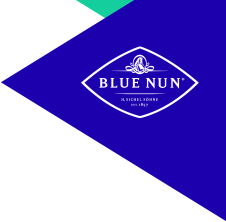BLUE NUN
History
Blue Nun has always forged its own unique history. The German brand was created in 1921 by H. Sichel Söhne, a company from Mainz with roots dating back to 1857.
During the Second World War, the German wine industry struggled, especially with its export business. After the war, H. Sichel Söhne set up offices in London and New York, where they laid the foundation for the international success of Blue Nun.
The Blue Nun brand experienced dramatic growth from the 1950s through the 1980s. During those decades, international stars began to see the wine brand with a single label (“Liebfraumilch”) as the perfect accompaniment to glamorous nights on the town. As the first German wine brand distributed exclusively overseas, Blue Nun rose to international fame during this period to become one of the biggest brands in the world. And its success was not only due to its unique positioning and accessible palate.
“Blue Nun Goes Everywhere” was the claim that summed up the idea behind the brand and the wine in the 1970s: Blue Nun goes any time, any place and with anything. The well-balanced taste, tried and tested by consumers around the globe, still delights wine lovers today.
This distribution approach was bold – and revolutionary. So were the
marketing and PR activities for the wine, many of which were far ahead
of their time.
From the early 1970s to the 1990s, Blue Nun enjoyed immense popularity worldwide – also among the glitterati. Film stars and musicians lent their names and faces to the Blue Nun brand or created their own tributes to the wine in their songs. A bottle of Blue Nun even features in music by world-renowned artists.
Even today, Blue Nun still appears alongside great names in music. In 2017, the Blue Nun 24K Gold Edition joined Eric “E-Panda” Hernandez, lead drummer for Bruno Mars, on tour. Blue Nun and hip hop – just one more perfect pairing with plenty of glam!
Today, there are numerous parallels between the wine’s original founders and its present owners at Langguth Erben, the centuries-old winery that acquired the brand in the late 1990s.

